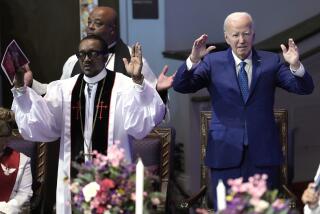On Most Issues, Clinton Is Winning Support From Religious Leaders : Presidency: Proposals on taxes, jobs and health care have received backing from many faiths. But his policy on abortion and homosexuality draws some opposition.
- Share via
NEW YORK — Most of the country’s religious leaders have warmed to the Clinton presidency, applauding many of its initiatives, although opponents of abortion and homosexuality are against his affirming such rights.
However, most of his key proposals--overhauling tax structures, deficit reduction, job programs and especially health care reform--are drawing broad support from religious leaders.
Officers of the principal Protestant and Orthodox organizations, the National Council of Churches, and agencies of Roman Catholicism have spoken in favor of these objectives.
In addition, the public affairs director of the chief organization of conservative evangelicals, the National Assn. of Evangelicals, said its member churches seemed to generally support Clinton’s economic program.
The Rev. Robert P. Dugan of Washington said: “As to whether it’s going to work or not, cynics say we’ve heard all this talk before, but if he scales the wall of skepticism and gets it done, we pray he’ll succeed.”
Among important Clinton goals that Dugan commended are more jobs, better health care, fair tax increases and reduced spending to cut the U.S. deficit. “It’s immoral to throw this humongous debt on the backs of our children and grandchildren,” he said.
A delegation of Roman Catholic bishops, led by Archbishop William H. Keeler, president of the National Conference of Catholic Bishops, met with Clinton this month, discussing their concerns, many of them shared by Clinton.
Among their concurring positions, sketched in February by the bishops committee on domestic policy, were tax reforms to increase revenues, targeted spending cuts that include reduced military spending, health care reform and investments to promote economic growth and employment.
The committee said the United States is “wasting valuable human resources--people who want to work and cannot find employment,” children who lack the education, health care and housing to grow into productive citizens, and cities that “breed violence and hopelessness” instead of opportunity.
“Increased revenues will clearly be required to reduce the deficit and to fund essential investment in meeting basic human needs,” said the committee, headed by Auxiliary Bishop John H. Ricard of Baltimore. “The tax system should be structured according to the principle of progressivity, so that those with relative greater financial resources pay a higher rate.”
The bishops remain at odds with Clinton over his support of abortion rights and homosexuals in the military and his opposition to sponsored school prayers and aid to parochial schools.
But after the meeting with Clinton, Keeler said: “We find much common ground on poor children and families, health care, foreign affairs and other important areas. . . . We hope this meeting will lead to an effective working relationship.”
He said the bishops want to work with the Clinton Administration in a constructive way, offering “cooperation and common ground whenever possible” and “respectful disagreement when it may be necessary.”
A similar stance has been expressed by Southern Baptist officials who also condemn abortion and homosexuality and want school prayers.
Several Jewish organizations, including the American Jewish Committee, have hailed the thrust of Clinton’s proposals.
Officers of the National Council of Churches, including most mainline Protestant and Eastern Orthodox denominations, also supported his main positions. The council’s general secretary, the Rev. Joan Brown Campbell, in a laudatory letter signed by several other Protestant leaders, said of Clinton:
“His vision of renewed economic life is refreshing in its intention to be fair, demanding and equitable. He puts forward proposals aimed at securing a more certain future for our children and grandchildren.”
“Religious people also know the meaning of hope,” she said, a word Clinton regularly has invoked. “But hope without costs is suspect,” she said. “When hope is costly, it makes real change possible.”
The statement particularly commended the proposals for more progressive tax structures, inclusive health care, creation of public service jobs, investment in children, reduced government expenditures and stimuli to business activity.
Representatives of interchurch organizations in about 100 cities met recently in Washington, stressing the need for public and private investment in cities, jobs and job training, ungraded education and universal health care.
The Rev. Benjamin Chavis of Cleveland, a United Church of Christ officer who served on the Clinton transition team, said the Administration has “not only an awareness” of the meeting’s positions but “an eagerness to work together” with the churches.
More to Read
Get the L.A. Times Politics newsletter
Deeply reported insights into legislation, politics and policy from Sacramento, Washington and beyond. In your inbox twice per week.
You may occasionally receive promotional content from the Los Angeles Times.










